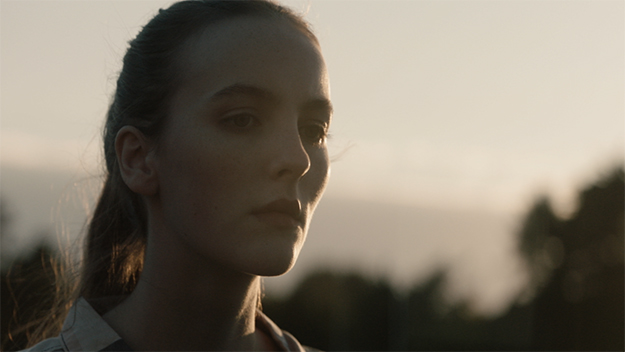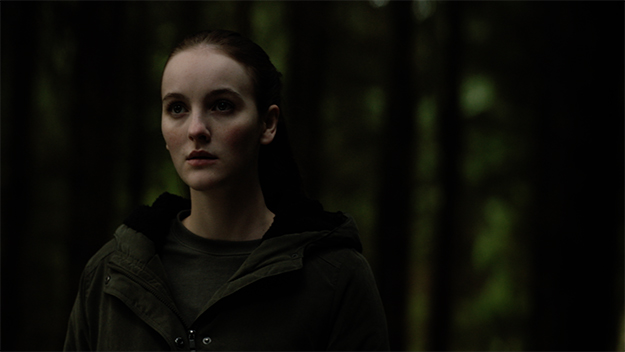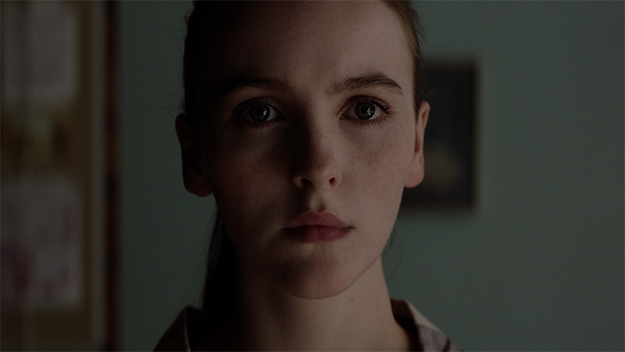Film of the Week: Rose Plays Julie

Images from Rose Plays Julie (Christine Molloy and Joe Lawlor, 2019)
There’s a curious feeling of déjà vu about Rose Plays Julie, a powerful new Irish feature that has just premiered in competition at the BFI London Film Festival. But then déjà vu often hovers strongly in the work of Christine Molloy and Joe Lawlor, who have worked together for a long time, sometimes trading under the name Desperate Optimists. Rose Plays Julie is about a young woman who goes in search of her birth mother; their first feature, Helen (2009), was also about a young woman preoccupied with the facts around her adoption. The new film’s heroine, Rose, wonders about the other life she might have lived under her birth name Julie, then effectively finds herself playing the role of Julie—effectively impersonating herself. Helen’s protagonist similarly plays a role, becoming a parallel version of herself: recruited to play a missing girl in a police crime reconstruction, she effectively slips into that girl’s skin. Helen itself, it’s worth adding, was an echo of a short prequel that Molloy and Lawlor made about the missing girl, Joy.
So if the duo appear to be repeating themselves in the new film, that’s simply an effect of the uncanny echo chamber quality they cultivate in their work. That’s not to say that what we’re watching here is really “Rose Plays Julie plays Helen”—simply that the way Molloy and Lawlor’s films investigate self, memory, and their mysteries is intensely self-reflexive and suggestive. Their new feature is in many ways more conventional than Helen in that, as soon as we realize what’s going on and where the plot is headed, we can easily classify the film as belonging to a certain thriller subgenre that’s very much in favor in our age of fraught gender politics. And when we reach the moment of payoff, the film clicks into a certain neatness that doesn’t entirely follow through on the promise of the film’s deeply unsettling grammar. Even so, the style—at once elusive and a more emphatic, expressionistic development of the couple’s previous work—is so distinctive that even an over-neat close doesn’t place too definite seal on the unrest that runs throughout the film.
In Helen and the series of shorts that preceded it—a project pitched between visual art and cinema, and collected under the title Civic Life—Molloy and Lawlor worked not just with nonprofessionals, but with non-actors recruited in open calls from local communities around Britain, and who were called on to incarnate or denote characters, or social types, rather than perform in any conventionally expressive manner. The result, in Helen, was a singular and very thorough sense of detachment, as if we were watching a simulation of a drama—or a ghostly repetition of an existing previous drama—rather than a drama per se, unique and ineffable. In Rose Plays Julie, the Optimists cast professional actors: Orla Brady, lead Ann Skelly (her second feature role, following TV work including Vikings), and Aidan Gillen, who starred in the duo’s underrated 2013 feature Mister John and also played a knowing cameo (effectively playing himself playing a historical character) in their fascinating essay documentary Further Beyond (2016). Nevertheless, the eerie detachment of Helen persists. Throughout the new film, it feels as if the characters themselves are playing roles, at times almost sleepwalking through them—until the problematic but fascinating moment at the end when all masks drop, and truth bites.
Young heroine Rose (Skelly) is first glimpsed at the start of the film standing on a windblown sea wall, addressing someone unknown in voiceover (“I think about you all the time”), someone she hasn’t yet met. A series of brief shots—Molloy herself edits, to a very distinctive, often staccato rhythm—show us various young people, and suddenly a horse, in a neatly drab institutional building. One of those functional spaces that the duo have explored in previous work—places not really soulless because they don’t altogether require a soul—it turns out to be a veterinary college, where Rose is a student, currently following a course of lectures on the ethics of animal euthanasia. The action switches to an even more staccato set of images: a police woman holding a gun, a car crashed into a tree at night, a young woman covered with blood, then a jarringly abrupt image that signals a step into genre fantasy: in fact, we’re watching a fiction, a film or TV show in which the police woman is played by a middle-aged actress named Ellen (Brady).

Rose has discovered that Ellen is her birth mother, and that she herself was named Julie before her adoption. Anxious to approach Ellen, she makes nervous phone calls, then hovers on the set of a costume drama in which Ellen is appearing as a red-cloaked nurse in a World War I setting. We see Ellen in several guises, in fact—she also appears as the heroine of an 18th-century romantic drama—and we can’t help wondering whether the role of successful actress, mother and reasonably wealthy middle-class homeowner is another part that she has mastered. It might not be a very acute observation to suggest that, even when being “themselves,” actors are really acting; but the word “plays” in the title (a knowing echo, perhaps, of Robert Greene’s 2016 self-reflexive Kate Plays Christine) makes us aware that everyone in Rose’s world is acting a role rather than unproblematically being themselves, whatever that might mean.
Eventually, Rose connects with Ellen, having visited her home in the guise of a potential buyer—a wonderfully awkward scene in which the estate agent (Joanne Crawford) sees through the imposture in moments. Eventually lowering her guard, Ellen tells Rose why she gave Julie up for adoption: because she was conceived in a rape. This revelation launches Rose on a mission.
It’s at this point that the film heads in a more conventional narrative direction, although Molloy and Lawlor sustain the uncanny tone they have established, leaving us uncertain whether we’re watching events that are simply happening, or images reproducing either a fantasy script in Rose’s head or a genre template provided by the movies and TV shows that are Ellen’s livelihood. It’s clear by the end that what appears to happen actually does happen—yet it still feels to some degree as if it’s framed within quotation marks, reworking certain available thriller tropes. That’s not to say the film is any way executed in bad faith: it just maintains a speculative distance that is integral to Desperate Optimists’ imagination.
It’s in the second half of the film that Rose plays Julie, properly speaking, donning a bobbed wig and signing up as volunteer on a dig organized by archeologist and media star Peter (Gillen)—a smooth predatory smiler who could almost be a cut-out monster if not for the mundane vulnerability with which he is invested by Gillen’s performance and physical presence. There’s a shot of him standing by a window with his shirt off, and the flabby pallor of his chest (Gillen is generally lit to give his skin a tired, waxy pallor) so thoroughly demystifies Peter’s abjection that you almost feel bad for him—almost. It’s not the only moment in the film that exposes the materiality of flesh: there’s an animal autopsy moment that could well harden your resolve to cut back on the beef.

The actress among these characters is paradoxically the person who seems most immediately real, most direct and uncomplicated. Brady makes Ellen’s reactions and thought processes clear and readable; after all, we know exactly when she is acting because at those moments she is in costume. Rose, however, is almost permanently undercover. For much of the time, it’s only her internal monologue, delivered in voiceover, that tells us what she’s thinking—although even then, she may be speaking her script of the kind of thoughts she feels she should be thinking. What’s more, she’s re-creating an image; a photo of herself as a girl, back to the camera, on the same sea wall where we first saw her.
Ann Skelly is magnificently perplexing as Rose/Julie: she has huge eyes that in this role seem to register rather than express, and strikingly elongated, angular features that lend themselves to near-opacity. There’s an extraordinary moment when Ellen tells Rose about her conception, and Skelly’s face just slowly, almost imperceptibly clouds over, before a tear appears; I can’t think of any more apposite way of describing this slowest of slow-burn reactions.
Shot by Tom Comerford, the film has a more ample, expressionistic visual palette than Helen, which adopted a forensic cleanness—although there are touches of that here too. Particularly striking is the film’s penchant for functional spaces that are essentially empty stages for action. Just as the college’s lecture theater or its surgical spaces are simply venues designed for certain purposes, so even homes have an impersonal feeling: Ellen’s house was originally a show home on an estate, while Peter’s originally belonged to his wife Teresa (Catherine Walker) and her former husband. It’s as if no one really lives anywhere, or is properly rooted in a place (or indeed a self); homes, however well-appointed, are as impersonal as the blandly chic hotel corridor along which the camera creeps.
That creeping movement is integral to the film’s style—an inexorable, ominous forward motion that is disrupted at key moments by Molloy’s abrupt editing, which at moments goes the whole Resnais/Roeg nine yards. This comes to a head when a brutal confrontation takes place, and is then played back in abrupt fragments that punctuate a shot of one character standing stunned, as if not knowing what’s (literally) hit them.
The film reaches a disturbing ending that some viewers may not be able to easily accept, as mother and daughter find communion in a very drastic act of complicity. Suffice to say, the climax is no less troubling in the light of the measured discussions of veterinary ethics that foreshadow it. But it’s a sign of the film’s singular savage irony that the phrase “Just give me a moment” may never sound quite the same to you again.
Jonathan Romney is a contributing editor to Film Comment and writes its Film of the Week column. He is a member of the London Film Critics Circle.







